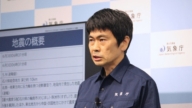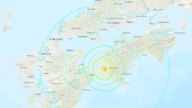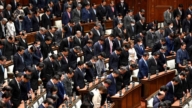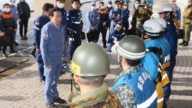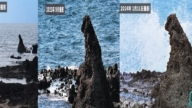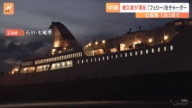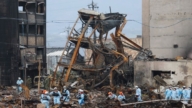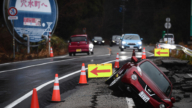【新唐人2011年3月14日讯】日本3月11号发生大地震。地震发生后,日本政府开放媒体,紧急救援机制高效运作,日本民众表现镇定,社会秩序稳定。中国民众对此赞叹和佩服的同时,将日本与中共在救灾中的差距进行了对比。此外,网上“愤青仇日言论”也引发了网友人性回归的呼吁。
这次地震是日本地震记录史上,震级最高的一次。“中国地震台网中心”原地震首席预报员孙士鋐表示,日本这次地震的破坏力,相当于20多个汶川地震。
面对震级如此之高的地震,日本的民众却表现得非常“淡定”。在街头,尽管可以明显看到建筑物起火,但人们的脸上没有惊恐、慌乱表情,总体上车流、人流秩序井然。
在日本地震电视直播中,日本电视台报导日本民众大量避难于学校、体育馆等公共场所,因为信任这些场所的安全质量和建筑质量。而在中国汶川地震,大量校舍倒塌,孩子葬身学校,多数屹立不倒的却是政府大楼。而大量灾民没有食物药品,住在露天、交通,通讯中断,伤民得不到及时救治。
日本政府通过电视,广播,手机,网路等各种途径,预告1分钟后即将到来的地震。地震发生后,日本国家电视台NHK不停播报海啸预警、余震预报、损失情况,指导国民避难。这与当时中共政府隐瞒地震预报,以及央视对汶川地震的灾害报导中,突出领导视察和指挥,形成鲜明对比。
地震过后,日本多地电话线路几乎瘫痪,但网路却非常畅顺,在通讯方面发挥了很大的作用,也有不少民众在空旷处等候之际,上传照片和视频。
中国人民大学教授张鸣对《德国之声》表示,中国一旦发生公共事件,中共就会遮蔽和实行媒体封锁。这样大的灾难,日本整个政府做到井井有条,最重要的是伤亡程度小。
他批评在汶川地震时,中共政府以地震是天灾的理由,来回避隐瞒地震预报不报。他还表示:灾后救援工作不到位,救灾防灾系统不完善,学校建筑不合格等问题,都导致大量的人员伤亡。中共政府无能力改善和做到的事情,就只有遮罩。中国人甚至有些羡慕日本。
与此同时,中国网路上出现“我祈祷全日本都地震”,“热烈庆祝日本发生特大地震!”等愤青仇日言论。
《时尚先生》杂志主编钭江明表示:在中国有这样一些人,和中共的教育有直接关系。他认为,中国一直没有人性及爱的教育,及普世价值的尊重,这其中根本原因是体制性障碍。这是一种“人性灾难”。恢复人性是更难的事情,比对一个“废墟”的重建要难得多。
《南方周末》评论员笑蜀也回应说:“从九一一的叫好声到今天日本地震的叫好声,在在印证我们国家首要的和最艰钜的工作,是修复人性,否则一切无从谈起。”
新唐人记者王子琦、黄容综合报导。
China Reflects on Japan’s Disaster
After the Mar. 11 earthquake,
the Japanese government opened up the media
and started emergency mechanisms. Japanese civilians
appeared to be calm and in goodsocial order, which
amazed Chinese people and stirred a comparison
in rescue efforts by Japan and the CCP.
Anti-Japan remarks online by pro-CCP activists
prompted Chinese netizens to urge
Chinese nationals to take a regression of humanity.
This earthquake has been the strongest on record.
Sun Shihong, ex-chief earthquake predictor
of China Earthquake Networks Center, said,
this quake is equivalent to 20 like that of
Sichuan in 2008..
Facing such a strong quake, Japanese civilians
behaved extremely calmly. On the streets, there was
no sign of fear or chaos. The traffic was orderly.
Live TV broadcasts showed that many people took
refuge in public buildings like schools and gyms.
People trust the quality and safety of these buildings.
But in the 2008 Sichuan earthquake, many school
buildings collapsed due to shoddy construction,
resulting in many student deaths, while most
government buildings survived the quake.
Many Chinese victims had to live outside, with no
transportation and communication or medical care.
Japanese government propagates the imminent
earthquake information via TV, radio, SMS and
internet. After the earthquake took place, the
Japanese national TV station NHK continuously
broadcasted the forecasts for tsunami, aftershocks
and casualties, and directed people to refuges.
This is in great contrast to the CCP’s holdup of
earthquake forecasts and CCTV’s focused reports
on how leaders directed the rescue efforts,
rather than victims’ plights.
After the earthquake, telephone lines were paralyzed
in many places in Japan, but the internet was still fast.
It played an important role in communications.
Many people uploaded pictures and videos
while waiting in the open air.
Zhang Ming, a professor from China’s Renmin University,
told Deutsche Welle, if any public events take place,
the CCP would block the media.
Facing such a major disaster, the Japanese
government did things orderly to minimize
the casualties.
Zhang criticized the CCP regime for not publicizing
the Sichuan earthquake forecasts, with the excuse
that natural disasters are unpredictable.
He said, poor relief efforts, inferior emergency systems,
and shoddy school building construction caused huge
casualties. Anything the CCP regime is incapable of
achieving would be covered up. He said,
Chinese people are somewhat admiring Japan.
Meanwhile, pro-CCP activists’ posted anti-Japan slogans
online, e.g., “I pray for earthquakes for the whole of
Japan”, “Let’s celebrate Japan’s giant earthquake!”
Tou Jiangming, editor-in-chief of Esquire said:
“The CCP created such people. In China, there
is no humanity and compassion due to the
barrier posed by the social system.
This is a humanitarian disaster. Restoration of humanity
is more difficult than re-construction from rubble.”
Xiao Shu, commentator of the Southern Weekend,
said: “The cheers on Sept. 11 and the earthquake
in Japan today repeatedly indicate that the first and
most difficult task is to restore humanity in China.
That must be the first step, and we go from there..
NTD reporters Wang Ziqi and Huang Rong.


